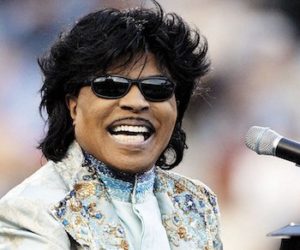
Little Richard
On this date in 1932, Little Richard was born. He was a Black musician, composer, singer, and Rock & Roll Icon.
Born Richard Wayne Penniman, he was one of 12 children born to Charles "Bud" Penniman, a Seventh-Day Adventist preacher who sold moonshine on the side. Richard grew up in Macon, Georgia. Music was all over. Street vendors and evangelists would sing, selling everything from vegetables to religion. The neighborhood sang spiritual songs as they worked. Several gospel singers influenced Richard.
As a kid, he sang gospel with the Penniman Singers and Tiny Tots Quartet. Richard's hyperactive personality made him popular but also got him into trouble. His homosexuality didn't help, so he left home and danced to draw customers in a traveling medicine show. By age 15, he was a regular with Sugarfoot Sam's Minstrel Show. At 18, he won a talent contest in Atlanta, leading to a recording contract with RCA Victor. Four records were recorded that went nowhere. In 1955, Art Rupe of Hollywood-based Specialty Records got a demo tape from Richard. That same year, Richard came to J&M Studios in New Orleans for the first time. He recorded some of the greatest songs in rock and roll history with producer Bumps Blackwell.
Later that year, "Tutti-Frutti" crossed over from the R&B to the pop chart, rising to #17. This was followed by "Long Tall Sally," released on Specialty Records, topping the R&B chart for eight weeks and reaching #6 on the pop chart. Richard hit #2 on the R&B chart and #33 on the pop chart with "Slippin' and Slidin' (Peepin' and Hidin')" and #1 on the R&B chart and #17 on the pop chart with "Rip It Up." In 1957, He hit #1 on the R&B chart and #21 on the pop chart with "Lucille," #3 on the R&B chart with "Send Me Some Lovin'," #2 on the R&B chart, and #10 on the pop chart with "Jenny, Jenny" and #2 on the R&B chart and #8 on the pop chart with "Keep A Knockin'."
That same year, Richard left rock and roll for religion. He entered Oakwood Theological College in Huntsville, Alabama. One year later, he hit #4 on the R&B chart and #10 on the pop chart with the Specialty release "Good Golly, Miss Molly." In 1959, the album “Little Richard Sings Gospel" was issued on the 20th Century label. In the coming years, he recorded gospel for the Mercury and Atlantic labels, working with producers such as Jerry Wexler and Quincy Jones.
In 1970, he quit music at the height of his career to re-enter Oakwood Theological College. He received a BA from the college and later became ordained as a Seventh-Day Adventist minister. That same year, Richard released "The Rill Thing," the first of three albums. It was followed by "The King of Rock and Roll" and “The Second Coming.” The last of these reunited him with the core crew from his historic 1950s sessions in New Orleans. In 1977, Richard again walked away from rock and roll to embrace evangelical Christianity. He became a traveling Bible salesman and preacher following a period of drug and alcohol abuse. 1979, he released the gospel album "God's Beautiful City."
In 1986, Little Richard was inducted into the Rock and Roll Hall of Fame. That same year, he had a memorable role in the 1986 film Down and Out in Beverly Hills. In 1993, he received a Lifetime Achievement Award during the 35th annual Grammy Awards. One year later, Richard received a Lifetime Achievement Award from the Rhythm and Blues Foundation.
In 2015, Richard appeared before a paying audience, clad in sparkly boots and a brightly colored jacket, at the Wildhorse Saloon in Nashville to receive the Rhapsody & Rhythm Award and raise funds for the National Museum of African American Music. In 2016, his CD was released on Hitman Records "California (I'm Comin')" with released and previously unreleased material from the 1970s, including an acapella version of his 1975 single release, "Try To Help Your Brother." On September 6, 2017, Richard participated in a lengthy television interview for the Christian Three Angels Broadcasting Network.
Little Richard was a founding father of Rock & Roll whose shrieks, flamboyant garb, and joyful, LGBT-bending persona embodied the spirit and sound of that new art form. He died of cancer on May 9, 2020, at the age of 87.
Heart & Soul:
A Celebration of Black Music Style in America 1930-1975
by Merlis Davin Seay, foreword by Etta James
Copyright 2002, Billboard Books
ISBN 0-8230-8314-4